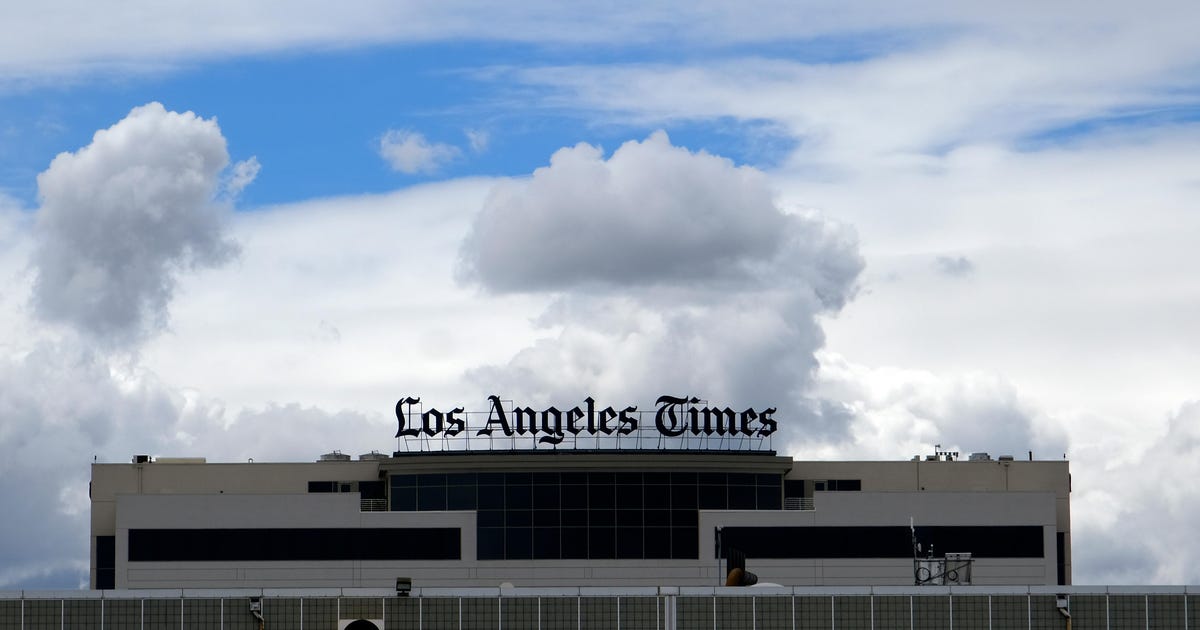The Los Angeles Times executive editor resigned last week amid sharp disagreements with the newspaper’s owner over coverage of the Israel-Hamas war.
Billionaire Dr. Patrick Soon-Shiong, who owns the newspaper, criticized the editor’s decision to limit coverage of the war in Gaza by journalists who signed a harsh statement of condemnation against Israel.
The editor, Kevin Merida (67), was appointed by Soon-Shiong in May 2021, a physician and biotechnologist who bought the paper in 2018 for half a billion dollars. Merida resigned five months before the end of his contract, giving prior warning to his senior deputies in the newspaper but not to the owner.
Likud minister formulates regulations to imprison citizens who ‘harm national morale’ Memorandum of Shin Bet law will enable Israel’s security agency to spy on journalists Number of journalists killed in Israel-Gaza war unparalleled, new report shows Merida decided in November that more than 30 journalists from the paper’s news department, who signed a statement describing Israel as an apartheid state committing genocide in Gaza, would be barred from covering the war for three months (until mid-February).
The statement was signed by more than 1,400 journalists worldwide. Merida consulted with his deputies, and sent a refresher on journalism ethics and the paper’s fairness policy to the staff, emphasizing that readers “should not identify private opinions in news coverage or feel that the organization is promoting an agenda.”
According to entertainment and media news website TheWrap, senior editors agreed that the decision to temporarily bar these journalists was crucial to guarantee the paper’s integrity in covering the conflict, even if there were few opponents.
New York Times reporter Jazmine Hughes, who signed a similar letter, resigned after her editor circulated a staff-wide statement saying it was a clear violation of the paper’s public protest policy.
However, Los Angeles Times owner Soon-Shiong and his daughter Nika Soon-Shiong, whose social network profile expresses pro-Palestinian opinions, opposed to Merida’s decision – though they did not demand that he change it – which intensified tensions between them. Soon-Shiong denied the connection between these events and Merida’s resignation in an interview with an L.A. Times reporter last week, but commented that he was “disappointed” that he had not been made aware of the decision ahead of time, hinting that he might have acted to prevent it. “We mutually agreed that he perhaps was not the right fit,” he said of the circumstances of Merida’s departure.
TheWrap revealed that the relationship between Soon-Shiong and Merida was never close, but in recent months, the owners’ interventions in news decisions and lack of support for the editorship’s independence had increased, joining other problems such as economic losses without an apparent rehabilitation plan.
Soon-Shiong also disputed some of the newspaper’s coverage in on health and science, which are his fields of research. L.A Times spokesperson Hillary Manning said the owner did not engage in editorial intervention and told TheWrap: “You will never find anyone credible to dispute that.”
Merida, on the other hand, told the LA Times last week: “I came to my decision based on a number of factors, including differences of opinion about the role of an executive editor, how journalism should be practiced and strategy going forward.” He did not give further detail. Last year, the Los Angeles Times fired dozens of workers – 13 percent of staff, including editors, proofreaders, photographers and video editors – which made Merida’s management of the newspaper harder.
He had previously run the Culture and Sports Unit on ESPN News and served as senior vice president of the network. Prior to that, he worked for 22 years at the Washington Post, where he rose to staff coordinator.
Los Angeles Times staff members told TheWrap that they valued Merida and were shocked by his departure; that they worry about the newspaper’s future, and are concerned that it would be difficult to recruit his replacement.
“If you don’t listen to your executive editor then there’s no point for the executive editor to be there,” a staff member said, criticizing the owner who, for the time being, claims he intends to remain in possession of the paper.
I have no problems with the departure of a newspaper editor who censors criticism of Israel while Israel commits genocide. The paper’s owner, however, caught my intrigue. A billionaire who’s pro-Palestine, owns a newspaper, and has largely respected the editorial independence of that newspaper – seems like a rare breed of billionaire
To add some nuance, he didn’t necessarily censor criticism, but would not work with reporters who publicly signed a letter criticizing Israel (I think I’m reading that correctly).
I hate how Israel goes to extreme measures to censor criticism, but it seems like there may the issue of a reporter making that criticism public and then reporting on the matter. Any controversy about motives could detract from the actual issues at hand.
I’m not making any comment about the appropriateness of the decision, just trying to provide nuance.
Likud minister formulates regulations to imprison citizens who ‘harm national morale’ Memorandum of Shin Bet law will enable Israel’s security agency to spy on journalists Number of journalists killed in Israel-Gaza war unparalleled, new report shows Merida decided in November that more than 30 journalists from the paper’s news department, who signed a statement describing Israel as an apartheid state committing genocide in Gaza, would be barred from covering the war for three months (until mid-February).
Am I the only one who thought I was having an aneurism reading that mess of a sentence?
Edit: Ohh, I looked at the archived article, those are supposed to be separate bullet points.




